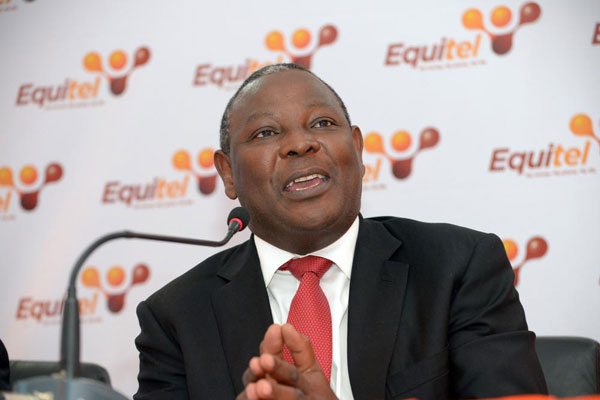
After Investing Ksh. 8 billion into Information Technologies for the last two years, the CEO of Equity Group Holdings Dr. James Mwangi can walk around with a swagger as his bank posts a 12% growth profit before tax on the back of growth in balance sheet, interest income and non-funded income.
In a presentation of Equity Group Holdings Financial results on Tuesday March 8th, 2016 at the their headquarters in Nairobi, Dr. Mwangi announced an increase in the dividend payout to shareholders by 13 % to Ksh.2.
During the presentation, the eloquent Dr. Mwangi revealed that during the year, the Group continued to deepen into digitization strategy through significant investment in IT spend over Kshs.8 billion over the last 2 years, resulting in a 39% increase in IT expenses and other operating costs and the results are visible in the transformation taking place.
He said that the volume of transactions on digital channels increased significantly with the number of transactions on agency network increasing by 35% to reach 51.3 million, while transactions on mobile banking platform Equitel increased by 1000% to reach 151 million.
He also said that the volume value of the digital transactions for Agency network increased by 37% to reach Kshs.341.5 billion, merchants business volume by 54% to reach KShs. 38.2 billion, while volume of total loans disbursed on mobile reached Kshs.8.5 billion on account of 1.922 million loans. The total number of mobile loans accounted for 78% of all the loans disbursed during the year.
“The growth is driven by a 24% expansion of balance sheet, 23% growth in interest income and 19% growth in non-funded income” said Dr. Mwangi while releasing the financial results.
Dr. Mwangi who is also a UN advisor on Inclusive Financial Sectors under the recently formed UN Advisors Group said the forthcoming year’s outlook looked even much brighter as the bank continues on its digitization strategy.
A detailed release distributed after Dr. Mwangi’s two-hour presentation, indicated that the balance sheet growth of 24% has been driven by a 23% growth on customer deposits, which supported a 26% growth on net loan book mainly to the SME sector which grew by 72%. The growth of non-funded income by 19% is as a result of 47% increase in diaspora remittances commission, 56% FX income growth and 53% increase in merchant commissions signifying success in diversifying the business lines.
The Group continued to consolidate its growth in SME lending with SME loan book contributing 71.8% of the total loan book. The SME loans supported the strengthening of contribution of non-funded income which accounted for 39% of all total income. The quality of the loan book improved from an NPL of 3.3% from 4.5% last year driven by improvement on the SME subsector that improved from 4.3% to 3.1% as a result of write-off of legacy book and supported by a 53% in loan loss provision of Kshs.2.43billion. Focus on SME has allowed diversification of earnings beyond interest income, transaction income to fees and commissions with FX income, Merchant banking commission, Trade Finance and Treasury income growing significantly.
On regional expansion, the Group continued to consolidate its position with entry to DRC through an acquisition. Regional banking subsidiaries contributed 23% of total assets, 23% of total deposits, 17% of loan book and 6% of total Group profits.
“This impressive contribution was inspite of currency turmoil that saw South Sudan devalue its currency by 84% while the Uganda and Tanzania Shillings depreciated by 10% and 12% respectively against the Kenya Shilling,” said the release.
It went ahead to explain that the year in addition to economic turbulence in the region characterized by volatility in interest rates, exchange rates and inflation resulting into recording of unrealized losses/gains on mark to market of Treasury bills and value of investments. The Group registered a total revaluation reserve loss of Kshs.6.8 billon made up of exchange loss on transaction of foreign investments of Kshs.5.7 billion and loss on fair valuation of treasury investments on AFS book of Kshs.1.1 billion. The Group is committed to the long-term strategy of regional expansion to take full advantage of economic regional integration and increasing intra-Africa trade. The regional banking subsidiaries recorded a 43% growth in profits on the back of 73% growth of their loan books.
The Group continued to invest in social and impact investments through its Foundation that has enhanced high growth in number of customers that reached 10.1 million by year end. The Group has focused on transformation and modernization of agriculture through agri-business initiatives, micro business enhancement through financial literacy and entrepreneurship training, inclusion through social payments and development of ethical leaders through scholarship under the Wings to Fly scholarship, and Equity Leadership development program.
The Group has enhanced dividend payout to shareholders to nearly 45% of profits available for distribution.
“We are confident that the Group has stabilized at a level where it is generating more cash than it requires for growth of business and hence the increase in dividend payout,” said Dr. Mwangi who added that the quality of the loan book has stabilized without significant risk for bad debts and capital ratios have stabilized at optimal levels. Dividend payout increased from Kshs.1.8 to KShs. 2.0 per share increasing dividend yield from 3.6% to 5.1% increasing actual proposed dividend amount to Kshs.7.5 billion up from Kshs.6.67 billion.
In general, the Group has retained stable capital with core capital to risk weighted assets being at 14.6% against a minimum requirement of 10.5%. Total Capital to risk weighted assets at 16.2% against a minimum requirement of 14.5% and core capital to total deposits ratio of 20.1% against a minimum requirement ratio of 10.5% and a strong liquidity position of 29.1% against a regulatory requirements of 20%.





